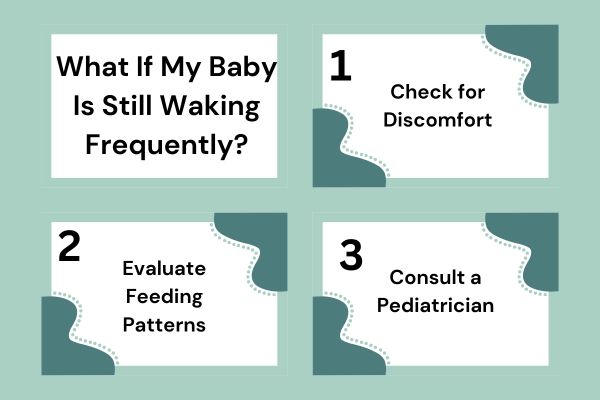You’re not alone if your 4 month old waking up every 2 hours at night. At this age, sleep disturbances are extremely common and frequently leave parents feeling irritated and worn out. Don’t worry, though; there are practical solutions for this problem. This post will explain the causes of frequent awakenings, what is typical for this age group, and how to improve both your baby’s and your own sleep.
You may want to read: Infant Wake Windows by Age
Why Is My 4-Month-Old Waking Up Every 2 Hours?

At around four months, many babies experience a major developmental milestone known as the 4-month sleep regression. This can lead to increased wakefulness and erratic sleep patterns. Here’s why:
Developmental Changes:
Your baby’s brain is maturing, and their sleep cycles are becoming more like those of adults. This means they cycle between light and deep sleep more frequently, making them more prone to waking up.
Hunger or Growth Spurts:
Growth spurts often occur around this age, causing babies to wake more frequently for extra feedings.
Sleep Associations:
If your baby relies on being rocked, fed, or held to fall asleep, they might wake up frequently looking for the same comfort.
Environmental Factors:
Noise, light, or an uncomfortable sleeping environment can also disturb their sleep.
Understanding the root cause of your 4-month-old waking up every 2 hours at night is the first step to solving the problem.
What to Expect From Sleep at 4 Months
Your kid should be sleeping 14–16 hours a day, including naps, around four months old. Nine to twelve hours is the typical amount of sleep at night, with occasional awakenings for feedings. The 4-month sleep regression, however, has the potential to momentarily alter this pattern.
Step-by-Step Guide to Help Your Baby Sleep Longer

Here’s a step-by-step guide to tackle the issue of your 4-month-old waking every hour or every 2 hours:
1. Establish a Bedtime Routine
A consistent bedtime routine helps signal to your baby that it’s time to sleep. You can include:
- A warm bath
- Reading a short book
- Gentle rocking or cuddling
- A soothing lullaby
Consistency is key. Repeat the routine every night to create a sense of predictability.
2. Create a Sleep-Friendly Environment
Ensure your baby’s sleep environment is comfortable and free from distractions.
- Use blackout curtains to keep the room dark.
- Maintain a cool temperature (around 68–72°F).
- Use a white noise machine to block out sudden noises.
3. Address Hunger Needs
If your 4-month-old waking up every 2 hours at night seems to coincide with hunger, consider cluster feeding in the evening. This ensures your baby is full before bedtime. Breastfed babies might still need one or two feedings at night, which is normal.
4. Encourage Self-Soothing
Teaching your baby to fall asleep independently can help them connect sleep cycles without waking you.
- Put your baby down drowsy but awake.
- Offer a pacifier or comfort object (if age-appropriate).
- Avoid picking them up immediately when they fuss; instead, wait a few moments to see if they settle on their own.
5. Gradually Reduce Sleep Associations
If your baby relies on rocking, nursing, or other forms of comfort to fall asleep, try gradually reducing these associations. For example:
- Rock your baby until they are calm but not fully asleep.
- Shorten feeding sessions during nighttime wake-ups.
This will help your baby learn to fall asleep independently.
6. Adjust Daytime Naps
Babies who nap too much during the day may struggle to sleep at night. Aim for 3–4 naps, with total daytime sleep of 3–4 hours. Avoid letting naps stretch beyond two hours, especially in the late afternoon.
7. Use Sleep Training Techniques (If Ready)
If you’re comfortable, consider using gentle sleep training methods to address frequent wake-ups. Popular methods include:
- The Ferber Method: Gradual intervals of comforting without picking up your baby.
- Pick-Up/Put-Down Method: Pick up your baby to comfort them and put them down once calm.
These methods can help address 4-month-old waking every hour while teaching your baby self-soothing skills.
What If My Baby Is Still Waking Frequently?

If your baby continues to wake up every hour or two despite following these steps, consider the following:
- Check for Discomfort: Teething, gas, or an illness may be disrupting their sleep.
- Evaluate Feeding Patterns: Ensure they’re getting enough calories during the day.
- Consult a Pediatrician: Persistent sleep troubles could indicate an underlying issue, such as reflux or allergies.
Recommended Products for Better Sleep

Here are some products that can help address the issue of your 4-month-old waking up every 2 hours:
- White Noise Machine: Helps create a consistent and calming sleep environment.
- Blackout Curtains: Blocks out light to promote deeper sleep.
- Sleep Sacks: Keeps your baby warm and secure without loose blankets.
- Teething Gel or Toys: Provides relief if teething is disrupting their sleep.
Investing in these products can make a significant difference in your baby’s sleep quality.
Wrapping It Up
It might be rather stressful to deal with a 4 month old waking up every 2 hours, but keep in mind that this stage is an indication of your baby’s development. You’re laying the groundwork for improved sleep habits by modifying routines, providing comfort, and establishing a peaceful sleeping environment. Every little step you take now will help your infant make the adjustment to longer, more restful sleep, so patience and consistency are essential. You’ll discover your rhythm and have restful evenings in the future if you put in the necessary time and effort.
FAQs About 4 month old waking up every 2 hours
1. Is it normal for a 4-month-old to wake up every 2 hours?
Yes, frequent wake-ups are common during the 4-month sleep regression due to developmental changes in sleep patterns.
2. Can teething cause a 4-month-old to wake every hour?
While teething isn’t typically severe at four months, some babies may experience discomfort that disrupts their sleep.
3. Should I feed my baby every time they wake up?
Not necessarily. If your baby is truly hungry, feed them. However, frequent wake-ups might also be due to sleep associations.
4. Can sleep training help my 4-month-old sleep through the night?
Gentle sleep training methods can be effective at this age, especially if your baby struggles to self-soothe.
5. How long will the 4-month sleep regression last?
The regression typically lasts 2–4 weeks, but implementing good sleep habits can help minimize its impact.





